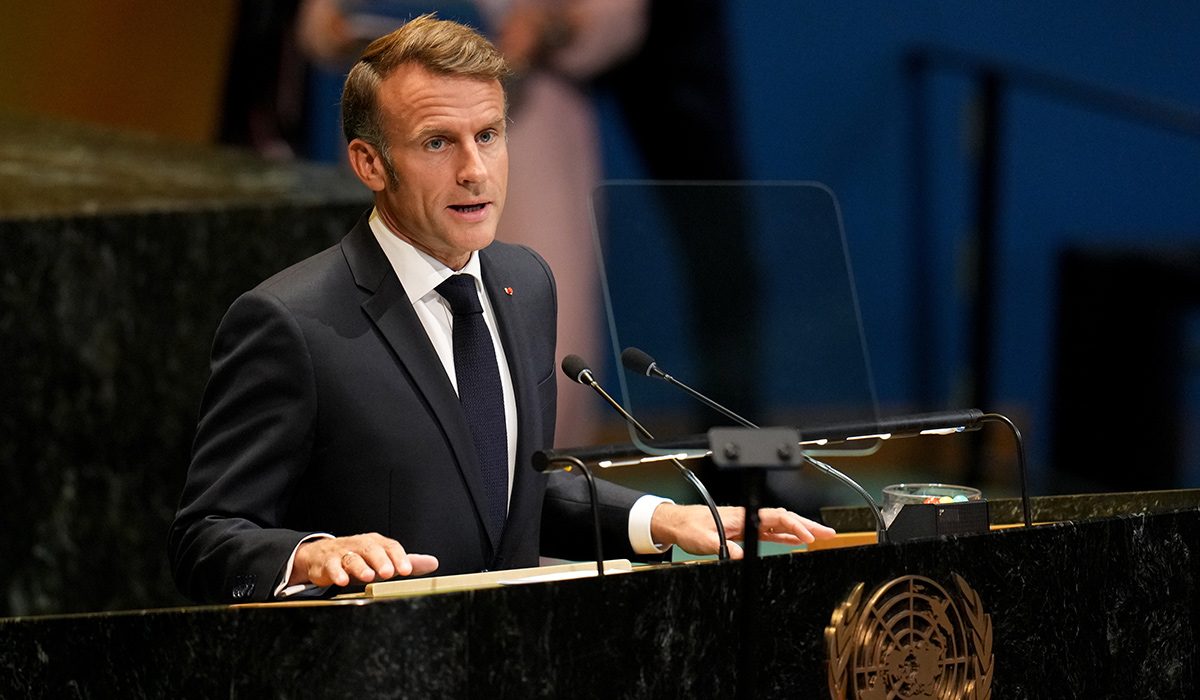Top Stories
France Joins Allies in Recognizing Palestinian Statehood at UN

UPDATE: France has officially recognized the statehood of Palestine during a momentous session at the United Nations General Assembly in New York. This significant announcement comes as part of a wave of support from Western allies, including the UK, Australia, Canada, and Portugal, all of whom made similar acknowledgments just days ago.
French President Emmanuel Macron declared, “Today, France recognizes the state of Palestine,” emphasizing the urgent need to pave the way for lasting peace. This recognition has sparked a strong response from Israel, whose government is currently intensifying its military operations in Gaza.
The Palestinian Authority hailed Macron’s decision as a “historic and courageous act.” In a related meeting with Saudi Arabia’s Crown Prince Mohamed Bin Salman, both leaders discussed potential paths toward a viable two-state solution, which envisions Israel and Palestine coexisting peacefully with agreed-upon borders.
However, tensions are high. The Israeli government has issued threats of retaliation against nations recognizing Palestinian statehood. Benjamin Netanyahu, Israel’s Prime Minister, is expected to respond once he returns to Israel next week. In a press conference, Israel’s UN Ambassador Danny Danon criticized the recognitions, stating, “Those issues were supposed to be negotiated between Israel and the Palestinians in the future.”
Amid escalating violence, Macron has made it clear that the release of hostages taken by Hamas during its October 2023 attacks will be a precondition for establishing a French embassy in Palestine.
Countries like Belgium, Malta, Andorra, Monaco, and Luxembourg have also joined the growing list of nations recognizing Palestinian statehood, indicating a significant shift in international diplomacy.
Speaking at the summit, Micheál Martin, the Taoiseach of Ireland, emphasized the critical nature of this moment. He stated, “The situation on the ground has rarely looked so bleak. A just and lasting peace seems further away than ever.” Martin condemned the Israeli government’s actions, describing them as having “clearly genocidal intent from day one.” He urged leaders globally to act to protect the two-state solution, warning that time is running out.
As the conflict rages on in Gaza, Israel’s continued military actions are leading to increasing isolation on the world stage. The United States and Israel boycotted the UN meeting, further distancing themselves from the growing global consensus. Secretary of State Marco Rubio warned that recognizing Palestine could exacerbate tensions, but many nations feel a pressing urgency to act before the two-state solution fades from possibility.
In a world increasingly horrified by the humanitarian crisis in Gaza, leaders are urged to keep the hope for peace alive. With the situation deteriorating rapidly, the recognition of Palestinian statehood marks a pivotal moment in international relations, prompting widespread discussion and potential shifts in policy.
As developments unfold, the international community will be watching closely for Israel’s response and the implications for future peace efforts. The recognition of Palestine is not just a diplomatic gesture; it is a call to action for a global response to the escalating crisis.
-

 Top Stories2 months ago
Top Stories2 months agoTributes Surge for 9-Year-Old Leon Briody After Cancer Battle
-

 Entertainment3 months ago
Entertainment3 months agoAimee Osbourne Joins Family for Emotional Tribute to Ozzy
-

 Politics3 months ago
Politics3 months agoDanny Healy-Rae Considers Complaint After Altercation with Garda
-

 Top Stories3 months ago
Top Stories3 months agoIreland Enjoys Summer Heat as Hurricane Erin Approaches Atlantic
-

 World4 months ago
World4 months agoHawaii Commemorates 80 Years Since Hiroshima Bombing with Ceremony
-

 Top Stories2 months ago
Top Stories2 months agoNewcastle West Woman Patricia Foley Found Safe After Urgent Search
-

 Top Stories4 months ago
Top Stories4 months agoFianna Fáil TDs Urgently Consider Maire Geoghegan-Quinn for Presidency
-

 World4 months ago
World4 months agoGaza Aid Distribution Tragedy: 20 Killed Amid Ongoing Violence
-

 World4 months ago
World4 months agoCouple Convicted of Murdering Two-Year-Old Grandson in Wales
-

 Top Stories3 months ago
Top Stories3 months agoClimbing Errigal: A Must-Do Summer Adventure in Donegal
-

 Top Stories3 months ago
Top Stories3 months agoHike Donegal’s Errigal Mountain NOW for Unforgettable Summer Views
-

 World4 months ago
World4 months agoAristocrat Constance Marten and Partner Convicted of Infant Murder









